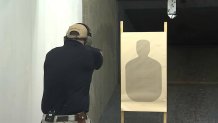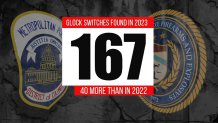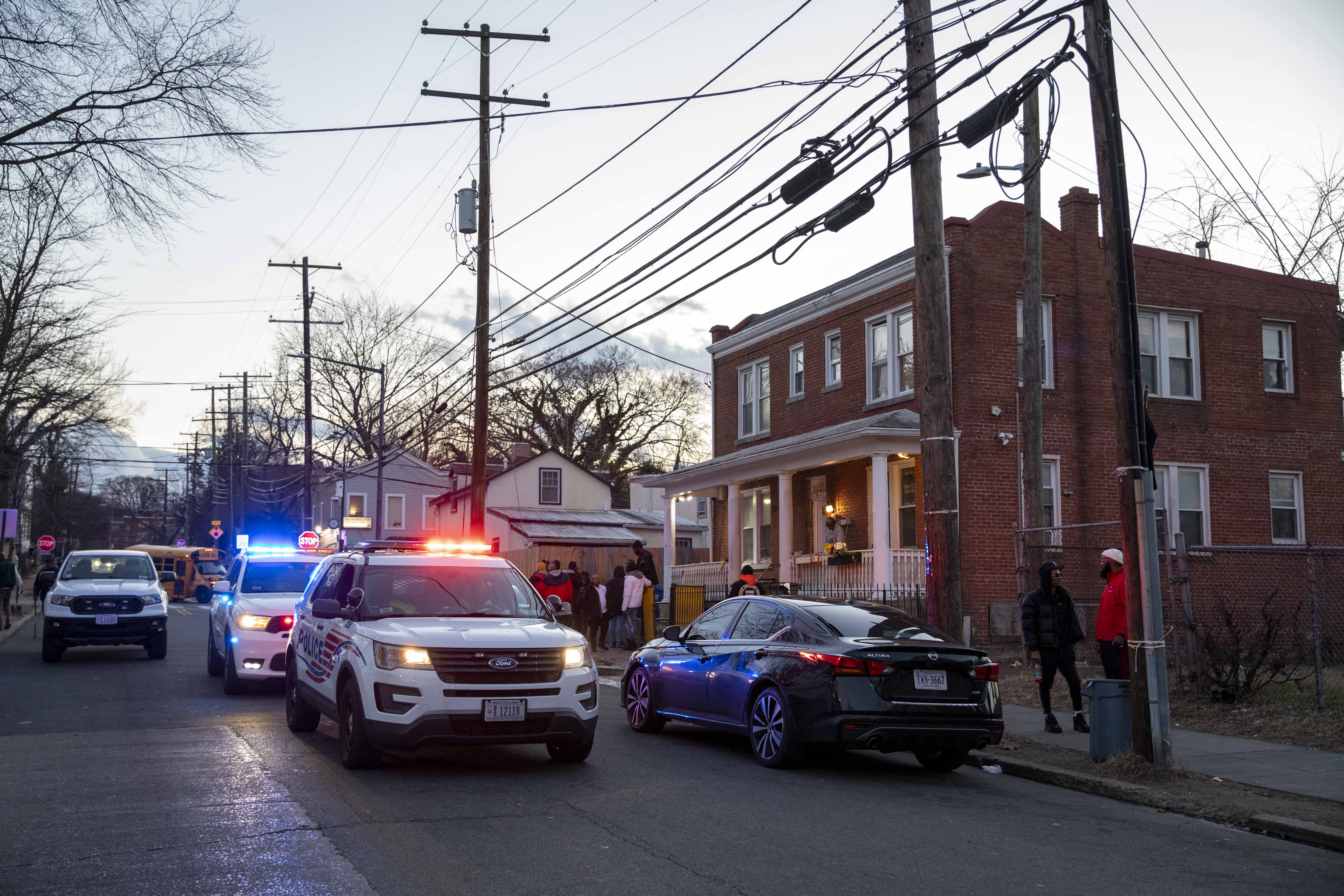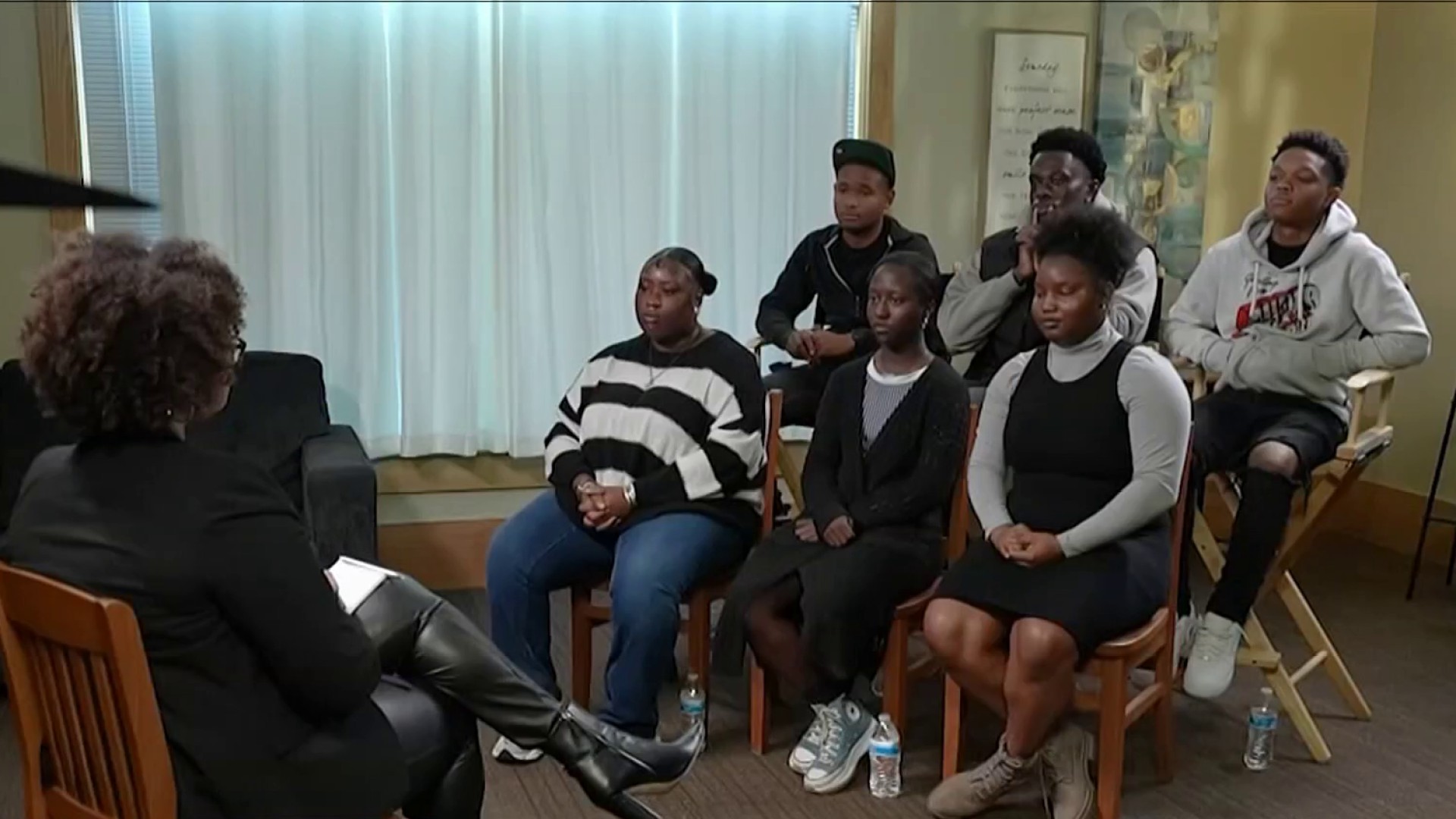As Washington, D.C., closes an especially deadly year, the News4 I-Team learned law enforcement and prosecutors are nervous about the “explosion” of Glock switches in D.C. and the lenient way District law treats them.
Glock switches, sometimes called “giggle switches” in D.C., are coin-sized accessories typically added to Glock-style handguns. They turn a semiautomatic handgun into a machine gun. Without them, a single bullet is fired with every trigger pull as the gun was designed. With the addition of the switch, the gun fires bullets until the magazine is empty.
On a recent trip to a Bureau of Alcohol, Tobacco, Firearms and Explosives range in D.C., the I-Team witnessed an ATF firearms expert fire five bullets in less than a second with a Glock switch-equipped handgun.
The danger is not just from the number of bullets, but what it does to the accuracy of a shooter. Even with years of experience working for the ATF, Firearms Enforcement Officer Wayne Moser could not hit what he was aiming at nearby.

“I was aiming dead center of the neck,” Moser said as the I-Team examined his target spotted with bullet holes far from his intended aim. “Definitely shot a couple of different spots."
And he is a former Marine. Few shooters in D.C. have that level of proficiency.
"It's an incredibly serious problem right now,” U.S. Attorney for the District of Columbia Matthew Graves said. “It's something that's relatively new that has exploded."

While they have been found in D.C. for years, police and ATF agents say they have found 167 of the devices in 2023. That is 40 more than in all of 2022, a more than 30% increase, with more than a month to go this year.
Craig Kailimai, the special agent in charge of the ATF’s Washington Field Division, told the I-Team he is “absolutely” scared it is going to get worse for his agents and for D.C. residents, too.
“You don't have to aim (with a Glock switch). You don't have to be precise,” he said. “You're sending 10 rounds at your target, whereas normally you would have been firing one round."
The ATF knows it, but so do people in D.C.'s neighborhoods.
'It's dangerous out here everywhere you go'
The I-Team visited three D.C. communities where federal court records show people have recently been arrested for using switches. It is not easy to get people to speak about the problem for fear of becoming a target. One mother said she homeschools her 11-year-old daughter for fear she would get caught in crossfire. Another man, who recently lost a nephew to a shooting involving a switch, said his nephew had been shot 19 times.
"It's very dangerous,” said one mother, who did not want to be identified.
She knows what a Glock switch sounds like fired outside her home and knows the devastation gun violence is creating. Just a year ago she said she lost a son shot multiple times.
“It's dangerous out here everywhere you go these days," she said.
The I-Team spoke with her a block from where court records show a man was arrested after 19 quick shots were detected by ShotSpotter, the gunfire detection technology used in cities across the country that senses the sound of any gunfire and can zero in on automatic fire in seconds.
As Glock switches have grown in popularity, the details of how brazenly they are shown off is chilling.
Federal court records show the work D.C. police do to track Glock switches and the people who have them. The I-Team reviewed cases in which defendants were seen on Instagram Live showing off switches. Another was found on Instagram after posting "Switch it up" over photos of switch-equipped guns. The Instagram photos are included in court records.
Others were found in music videos bragging about their switches.
Under federal law, the switches are illegal and punishable with serious prison time, but the federal courts do not take every case. That leaves many to be prosecuted under local D.C. laws, which defines these switches as machine guns but punishes them the same as a switchblade or brass knuckles. Under a law first passed in 1932, people caught with switches are eligible for a fine of no more than $2,500 and a year in jail.
Those penalties for possession of what could be an incredibly dangerous weapon are part of the reason U.S. Attorney Graves says District law does not treat machine gun possession seriously enough.
“There's this view that if a person is caught with a firearm but not quite using the firearm, it's some kind of possession offense and maybe it's not really that serious,” he said. “We think that that is dead wrong in all circumstances, but it is particularly wrong with these conversion devices."
Bill would toughen penalties for Glock switches
Graves is backing a bill from Councilmember Brooke Pinto to change that. That council legislation that would toughen penalties for possessing switches is still waiting on a vote. (Read Pinto’s “Addressing Crime through Targeted Interventions and Violence Enforcement (“ACTIVE”) Amendment Act of 2023” here. The changes involving gun charges are on pages 1 and 10.)
There is proof this is not just an issue of possession. The switches are being used. According to the ATF, 45% of the switches found in D.C. are attached to guns that can be traced to use in previous crimes.
“Not since prohibition have we seen so many machine guns being used to commit violent crimes," said Tom Chittum, who used to be associate deputy director at ATF.
He now works for the company that makes ShotSpotter.

The technology detected 400 automatic fire alerts nationwide in 2019. In 2022, there were more than 9,000 ShotSpotter automatic gun fire alerts nationwide. They predict even more this year. Across the country, ShotSpotter data shows that what D.C. is seeing is what communities all over America are seeing.
“The danger here, I think, is obvious,” Chittum told the I-Team. “The number of rounds, the rate of fire, the difficulty of controlling them and trying to hit what you're actually aiming at poses an incredible public safety risk."
D.C. police refused to share their ShotSpotter data with the I-Team, even denying a Freedom of Information Act request. D.C. police initially told the I-Team they did not have the data but later revised that, saying it was not available to the public.
Reported by Ted Oberg, produced by Rick Yarborough, shot by Jeff Piper and Carlos Olazagasti, and edited by Jeff Piper.




